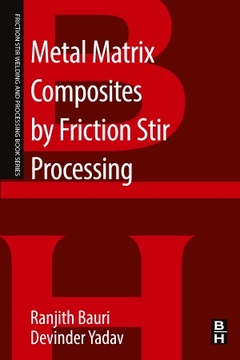Description
Metal Matrix Composites by Friction Stir Processing
Friction Stir Welding and Processing Series
Authors: Bauri Ranjit, Yadav Devinder
Language: English
Subject for Metal Matrix Composites by Friction Stir Processing:
Keywords
Abnormal grain growth (AGG); Al-Ni composite; Al-Ti composite; Al-W composite; Archard's law; Composite; Continuous dynamic recrystallization (CDRX); Discontinuously reinforced Al (DRA) composite; Dynamic recrystallization; EBSD; FSP; FSP process parameters; Friction stir processing; Grain refinement; Groove filling method; Hall-Petch relationship; Hardness; In situ composites; MMC fabrication; Material flow; Mechanical properties; Metal matrix composites (MMC); Metallic matrix composites; Micro
56.19 €
In Print (Delivery period: 14 days).
Add to cartSupport: Print on demand
Description
/li>Contents
/li>Readership
/li>Biography
/li>Comment
/li>
Metal Matrix Composites by Friction Stir Processing discusses the capabilities of utilizing friction stir processing (FSP) as a tool to manufacture new materials, such as composites. FSP is considered a tool for grain refinement. However, this work illustrates how FSP has a wider capability due to the material flow and mixing the process offers. This book highlights such aspects by demonstrating the ability of the process to incorporate a second phase and make metal matrix composites (MMCs). The book covers the current research on processing MMCs by FSP, and presents a novel approach of making ductile MMCs by FSP using metal particle reinforcements.
1. Introduction to Metal Matrix Composites2. Introduction to Friction stir processing (FSP)3. Processing Metal Matrix Composite (MMC) by FSP4. Processing Non-equilibrium Composite (NMMC) by FSP5. Surface Composite by FSP6. Summary and Future Direction
Researchers, Engineers, Students and Faculty of academic institutes
Dr. Devinder Yadav is a Research Associate in the Department of Mechanical Engineering at the University of Colorado, Boulder, USA. Dr. Yadav received his Master of Science (by research) and PhD in Metallurgical and Materials Engineering from Indian Institute of Technology Madras, India in 2010 and 2015, respectively. He was a Research Associate in the Department of Materials Engineering, Indian Institute of Science Bangalore, for short term. During his Masters and PhD, he carried out extensive work on development of non-equilibrium composite and solid solution by friction stir processing and carried out detailed investigation on the microstructure evolution, mechanical properties and thermal stability of these composites. His research interest include Friction stir processing, non-equilibrium composites, electron backscatter diffraction (EBSD), dynamic recrystallization and flash sintering. He has published 17 papers in peer reviewed journals. With a total of 171 citations, his h-index is 5. IIT Madras conferred him with Research Award in recognition of the quality and quantity of research work carried out during his PhD.
- Demonstrates how friction stir processing can be used to make metal matrix composites
- Includes a review of different approaches of making metal matrix composites by friction stir processing
- Demonstrates the utility of friction stir processing in making new types of non-equilibrium ductile composites
- Provides a comparison of properties of friction stir processed composites to those of conventional metal matrix composites




